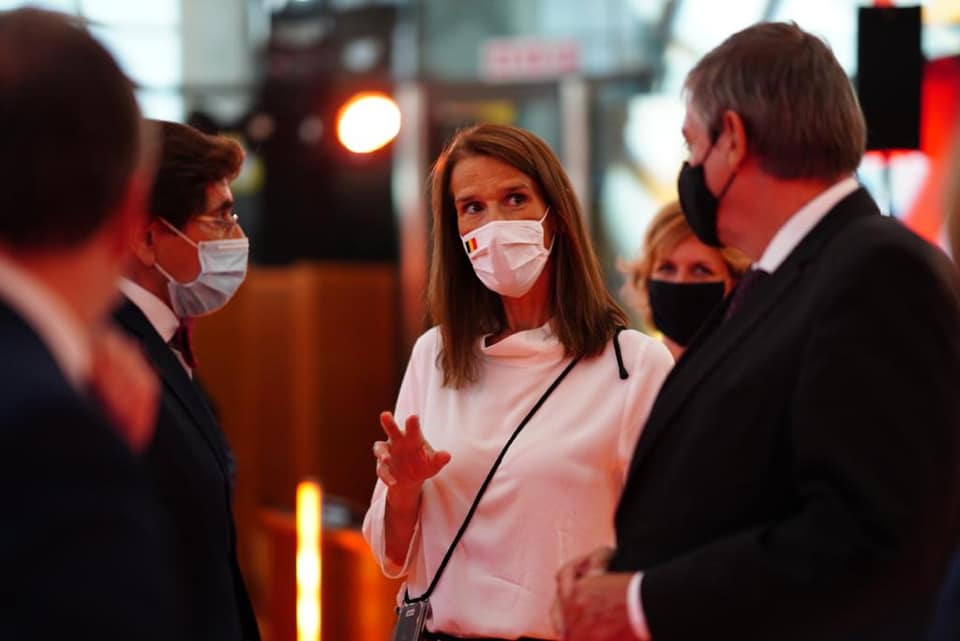Belgium’s endless existential identity crisis
As it stumbles from one political crisis to the next, Belgium faces a profound existential threat. But can the slow disintegration of the Belgian state be reversed and, if so, how?

Image: Facebook page of Sophie Wilmès
Friday 25 September 2020
Back in 2011, Belgium made it into the Guinness Book of World Records for the dubious achievement of going through the longest peacetime period without a government. Clocking in at 589 days, this was more than 200 days ahead of its nearest contenders, Cambodia (354 days) and Iraq (289 days).
This record appeared unbeatable… until now.
Last month, Belgium broke its own record. The country is still being run by a caretaker government because its squabbling parties have not managed to agree on a governing coalition. This is despite marathon negotiating sessions and a continuous stream of brave knightly politicians tasked by King Philippe to slay the dragon of political polarisation but who get their fingers burned instead.
Coalition negotiations have moved beyond the more common colour-coding conventions (purple-green,rainbow, etc.) to be dubbed the “Vivaldi coalition” in a nod to the Italian composer's violin concerti Four Seasons.
Like Antonio Vivaldi, Flemish liberal Egbert Lachaert (who is the 12th politician to lead the consultations to form a coalition since the elections way back in May 2019), has had the unenviable task of composing an agreement that, while not music to the ears of any party, can at least get socialists, liberals, greens and Christian democrats on both sides of the country's widening language divide singing from the same hymn sheet.
Just when it appeared that Lachaert may have hit the right notes and a full agreement, including the thorny question of who is to become prime minister, was expected to be sealed, COVID-19 struck, delaying the negotiations and throwing the situation back into disarray. This week, the king extended Lachaert's mandate in the hope that differences between the would-be coalition partners could be ironed out.
Even if a coalition is successfully formed and takes over the reins of government, it is open to question whether such a broad alliance will be stable and survive till the next election, especially given the destablising effect of the deep socioeconomic crisis gripping Europe and the world.
If the government falls again, it will be the unfortunate culmination of Belgium's second major crisis in less than a decade. This raises the question of what is behind this systemic failure.
One factor is the attempt to keep the far-right out of government. However, with the extremist Vlaams Belang performing strongly at the ballot box in 2019, maintaining this so-called Cordon Sanitaire (i.e. an exclusion zone around the far-right party) is proving harder than ever. The Nieuw-Vlaamse Alliantie (N-VA), which is one of the two largest right-wing parties in Belgium and part of the negotiations, has been openly questioning the Cordon Sanitaire.
Another major issue is the growing political gulf separating Belgium's two main regions. Francophone Wallonia tends to vote for more leftist and progressive parties, while Dutch-speaking Flanders generally prefers more conservative and right-wing parties.
This ideological divide, combined with growing animosity between Flemish nationalists and Francophone socialists, means that a coalition between the other largest party, the Parti Socialiste (PS) and the N-VA, is almost unthinkable.
Such a constellation would also likely be unworkable. This is partly ideological. The PS is social democratic, supports the EU and believes in climate action, while the N-VA is free-market neo-liberal, Eurosceptical and downplays climate change. They also disagree fundamentally about the future of Belgium, with the PS believing in a united Belgium and the N-VA seeking to decentralise the country out of existence.
This growing polarisation has placed almost unbearable strain on the model of consensual politics, known colloquially as the “Belgian compromise“, that has so effectively defused tension and stopped conflicts from spinning out of control since the country's founding in 1830.
In fact, the Belgian federal government has become so hollowed out, with decades of devolution effectively making regional governments more powerful, that many view the gradual death of Belgium as almost an inevitability.
As a naturalised Belgian citizen, I find this simmering disintegration of Belgium a shame – partly because I appreciate the eccentric appeal of this small multilingual, multicultural country.
Besides, although many believe that a country bringing together three official language communities (Dutch, French and German) is bound to fail the test of time and fall apart, I am convinced there is nothing inevitable about Belgium's slow-burning implosion.
In my view, the country is falling apart not because of irreconcilable differences between its communities but as a result of a devolution process that has gone too far.
Belgium has had neither national parties nor national media for decades. Education, too, has been regionalised, as has, bizarrely, foreign policy. Even its prized healthcare system, one of the best in the world, has not been unaffected by this regionalisation, with nine ministers holding health-related portfolios.
This, rather than fundamental differences between Flemings and Walloons, has led to the drifting apart of the country's constituent parts and a rise in distrust.
In reality, the difference between Belgium's two regions are far smaller than the divergence between states and regions in larger countries, such as China, India, Russia or the United States.
In some ways, Walloon and Flemish Belgians – who are, as much as one can generalise about national characters, understated, reserved and do not take themselves too seriously – have more in common with each other than with the people with whom they share a language across the border.
This explains why, if Belgium were to split apart, Walloons would not support becoming part of France and Flemings are opposed to joining the Netherlands, judging by the anecdotal evidence I have seen over the years. Moreover, the two communities do not have pleasant historical memories of life under French or Dutch rule. In fact, Belgium was founded following a revolution by its predominantly Catholic population against the Protestant King William I of the Netherlands.
Instead, what is vastly more likely is that Flanders would become an even tinier independent state and Wallonia would keep the name Belgium and hope for future reunification.
The best way to halt the disintegration of Belgium and stop it from devolving into two irrelevant countries is to pursue a process of gradual reintegration that moves beyond the fossilised issue of language and looks towards the common interest of all Belgians.
A first step in that direction would be to reintegrate Belgium's political system by reintroducing national parties. This would stabilise the volatile political system by making it easier to create coalitions, thereby reigniting the spirit of Belgian compromise.
Other steps would be to reintegrate the media, to help create greater awareness and understanding between the communities, and reform education so that every Belgian child receives full immersion in Dutch and French.
Belgium often strikes the outsider as quirky and surreal. But it makes no less sense as a country than any other and has, to its credit, avoided the kind of costly and destructive conflict that has brought other polarised societies to their knees. Let us hope that this sense of pragmatism and the country's legendary capacity for “Belgian compromise” regain the upper hand.
___
This is the updated version of an article which was published by Al Jazeera on 9 September 2020.


Pingback: Deconstructing Belgium and its future - The Chronikler